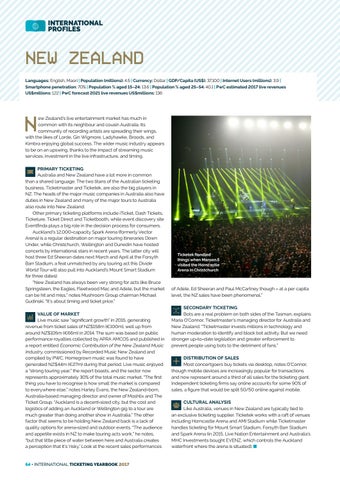INTERNATIONAL PROFILES
NEW ZEALAND Languages: English, Maori | Population (millions): 4.5 | Currency: Dollar | GDP/Capita (US$): 37,100 | Internet Users (millions): 3.9 | Smartphone penetration: 70% | Population % aged 15–24: 13.6 | Population % aged 25–54: 40.1 | PwC estimated 2017 live revenues US$millions: 122 | PwC forecast 2021 live revenues US$millions: 136
N
ew Zealand’s live entertainment market has much in common with its neighbour and cousin Australia. Its community of recording artists are spreading their wings, with the likes of Lorde, Gin Wigmore, Ladyhawke, Broods, and Kimbra enjoying global success. The wider music industry appears to be on an upswing, thanks to the impact of streaming music services, investment in the live infrastructure, and timing. PRIMARY TICKETING Australia and New Zealand have a lot more in common than a shared language. The two titans of the Australian ticketing business, Ticketmaster and Ticketek, are also the big players in NZ. The heads of the major music companies in Australia also have duties in New Zealand and many of the major tours to Australia also route into New Zealand. Other primary ticketing platforms include iTicket, Dash Tickets, Ticketure, Ticket Direct and Ticketbooth, while event discovery site Eventfinda plays a big role in the decision process for consumers. Auckland’s 12,000-capacity Spark Arena (formerly Vector Arena) is a regular destination on major touring itineraries Down Under, while Christchurch, Wellington and Dunedin have hosted concerts by international stars in recent years. The latter city will host three Ed Sheeran dates next March and April at the Forsyth Barr Stadium, a feat unmatched by any touring act (his Divide World Tour will also pull into Auckland’s Mount Smart Stadium for three dates). “New Zealand has always been very strong for acts like Bruce Springsteen, the Eagles, Fleetwood Mac and Adele, but the market can be hit and miss,” notes Mushroom Group chairman Michael Gudinski. “It’s about timing and ticket price.” VALUE OF MARKET Live music saw “significant growth” in 2015, generating revenue from ticket sales of NZ$158m (€100m), well up from around NZ$105m (€66m) in 2014. The sum was based on public performance royalties collected by APRA AMCOS and published in a report entitled Economic Contribution of the New Zealand Music Industry, commissioned by Recorded Music New Zealand and compiled by PWC. Homegrown music was found to have generated NZ$44m (€27m) during that period. Live music enjoyed a “strong touring year,” the report boasts, and the sector now represents approximately 30% of the total music market. “The first thing you have to recognise is how small the market is compared to everywhere else,” notes Harley Evans, the New Zealand-born, Australia-based managing director and owner of Moshtix and The Ticket Group. “Auckland is a decent-sized city, but the cost and logistics of adding an Auckland or Wellington gig to a tour are much greater than doing another show in Australia.” The other factor that seems to be holding New Zealand back is a lack of quality options for arena-sized and outdoor events. “The audience and appetite exists in NZ to make touring acts work,” he notes, “but that little piece of water between here and Australia creates a perception that it’s ‘risky.’ Look at the recent sales performances
64 • INTERNATIONAL TICKETING YEARBOOK 2017
Ticketek handled things when Maroon 5 visited the Horncastle Arena in Christchurch
of Adele, Ed Sheeran and Paul McCartney though – at a per capita level, the NZ sales have been phenomenal.” SECONDARY TICKETING Bots are a real problem on both sides of the Tasman, explains Maria O’Connor, Ticketmaster’s managing director for Australia and New Zealand. “Ticketmaster invests millions in technology and human moderation to identify and block bot activity. But we need stronger up-to-date legislation and greater enforcement to prevent people using bots to the detriment of fans.” DISTRIBUTION OF SALES Most concertgoers buy tickets via desktop, notes O’Connor, though mobile devices are increasingly popular for transactions and now represent around a third of all sales for the ticketing giant. Independent ticketing firms say online accounts for some 90% of sales, a figure that would be split 50/50 online against mobile. CULTURAL ANALYSIS Like Australia, venues in New Zealand are typically tied to an exclusive ticketing supplier. Ticketek works with a raft of venues including Horncastle Arena and AMI Stadium while Ticketmaster handles ticketing for Mount Smart Stadium, Forsyth Barr Stadium and Spark Arena (in 2015, Live Nation Entertainment and Australia’s MHC Investments bought EVENZ, which controls the Auckland waterfront where the arena is situated).
